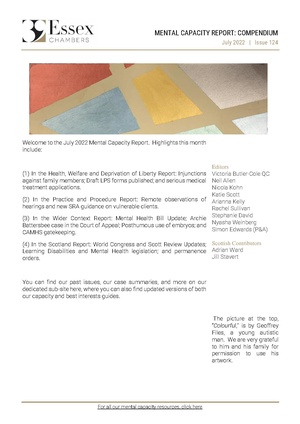Information for "A NHS Foundation Trust v G (2022) EWCOP 25"
Basic information
| Display title | A NHS Foundation Trust v G [2022] EWCOP 25 |
| Default sort key | A NHS Foundation Trust v G (2022) EWCOP 25 |
| Page length (in bytes) | 1,335 |
| Page ID | 14366 |
| Page content language | en - English |
| Page content model | wikitext |
| Indexing by robots | Allowed |
| Number of redirects to this page | 0 |
| Counted as a content page | Yes |
| Page image |  |
Page protection
| Edit | Allow only users with "editing" permission (infinite) |
| Move | Allow only users with "editing" permission (infinite) |
Edit history
| Page creator | Jonathan (talk | contribs) |
| Date of page creation | 21:52, 25 June 2022 |
| Latest editor | Jonathan (talk | contribs) |
| Date of latest edit | 20:24, 27 October 2022 |
| Total number of edits | 9 |
| Total number of distinct authors | 1 |
| Recent number of edits (within past 90 days) | 0 |
| Recent number of distinct authors | 0 |
Page properties
SEO properties
Description | Content |
Article description: (description)This attribute controls the content of the description and og:description elements. | G, now 27 years old, had been in a children's hospital since the age of 13. A previous judgment had decided that she should be transferred to a care home prior to any return home, but her father had sabotaged that placement. The Trust sought injunctive relief against G's father, mother and grandmother, in order to put in place clear boundaries to manage their behaviour. The family argued unsuccessfully that the s16(5) MCA 2005 power to make further "necessary or expedient" orders applied only in the context of the appointment of deputies, that s47(1) MCA 2005 (and therefore s37(1) Supreme Court Act 1981) is not apt to cover restricting behaviours in the context of either a hospital or care home, and that little or no weight should be afforded to the hearsay evidence of anonymous nurses about the father's behaviour. The court granted the relief sought. |